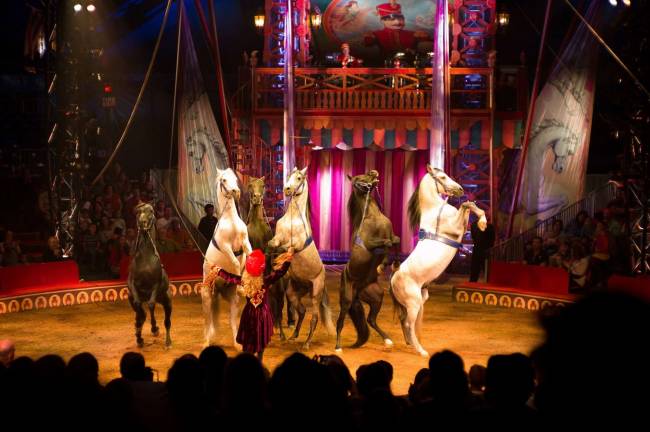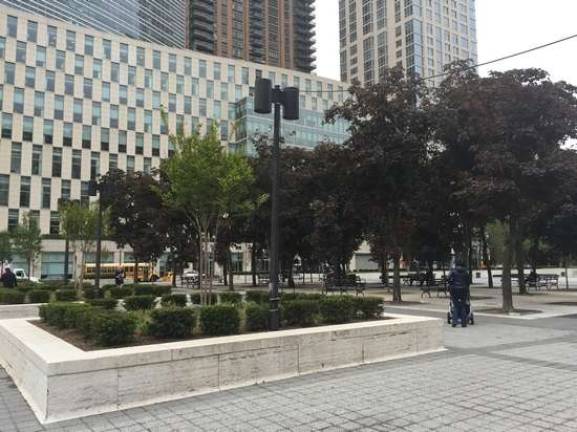Return of circus to Park rekindles tensions


The Big Apple Circus is set to return to Damrosch Park next month after a tumultuous one-year hiatus from the venue during which the circus, formerly a nonprofit, declared bankruptcy and was reconstituted as a for-profit business. But as Big Apple prepares to pitch its tent again in its former longtime home, it faces opposition from some neighbors, parks advocates and local officials, who claim that hosting the revamped circus in Damrosch Park is an inappropriate use of public land by a commercial enterprise, and may violate the terms of a 2014 legal settlement.
Damrosch Park, a 2.4-acre plaza on West 62nd Street between Columbus and Amsterdam Avenues, is a public park that owned by the city but operated and managed by Lincoln Center under a license agreement with the Parks Department. Lincoln Center hosts various programming in the space, such as free outdoor concerts and movie screenings, as well as larger events that occupy the park for longer periods of time, such as the circus and, formerly, Fashion Week.
Until it filed for bankruptcy last year, Big Apple Circus had been a fixture in Damrosch Park since the 1980s, staging performances in the plaza for a few months each year. The circus, which had previously operated as a nonprofit, was bought at auction earlier this year by Florida-based investment firm and relaunched as a for-profit venture. In March, the reconstituted Big Apple Circus reached an agreement with Lincoln Center to return to Damrosch from Oct. 8 to Feb. 1 for the next 10 years. The circus’s first performance of the 2017 season is scheduled for Oct. 27 with tickets already on sale.
Helen Rosenthal, the city council representative whose district includes the park, has criticized the deal. “They’re using a name of what was a public nonprofit to mask what is now a private company,” Rosenthal said. “I’m opposed to it.”
Lincoln Center’s management of the park has been a repeated point of contention with some community members, who feel that the open space has been used too often for special events. Fashion Week was the subject of a 2013 lawsuit filed by community members and parks advocates, who claimed that the event, which was held in the park for several years, was an inappropriate non-park use of the space and violated the state’s Public Trust Doctrine, a common-law standard that holds that parkland exists for the benefit of the public at large, not just for some. The plaintiffs reached a settlement with Lincoln Center and the Parks Department in 2014, after which Fashion Week was relocated and Lincoln Center implemented a landscape plan to replace trees and shrubs that had been uprooted to make room for tents during the event.
Though the impetus of the 2014 settlement was the use of the park for Fashion Week, some opponents of the new agreement with Big Apple Circus say that the settlement includes terms that are not specific to Fashion Week and also apply to events like the reconstituted circus. Specifically, they point to a clause in the 2014 settlement that states that the city and Lincoln Center “intend to further expand public access to the Park by not entering into agreements for commercial events substantially similar in nature, size and duration to Fashion Week and for which access is not generally available to the public.”
“It almost describes the Big Apple Circus exactly,” Bill Raudenbush, a local activist and critic of the new circus deal, said of the language in the 2014 settlement. “It’s no small thing that it’s for-profit and takes up almost the entire park.” (Raudenbush, who is running as an independent for the City Council seat held by Rosenthal, said that he credits the incumbent for her stance on the issue.)
Rosenthal, who chairs the City Council’s contracts committee, plans to look into whether Lincoln Center’s new agreement with Big Apple Circus violates the letter or spirit of the 2014 settlement. “I’ve already let Lincoln Center know I plan on investigating this very seriously,” she said. “It’s very upsetting to me.”
Olive Freud, who serves as president of the Committee for Environmentally Sound Development, a plaintiff in the 2014 lawsuit, said that her group and other plaintiffs in the suit plan to send a letter to Lincoln Center and the city expressing concern that the terms of the settlement are not being met. “There were enough stipulations in there to protect the community, and if they violate the stipulations they’ll be taken to court,” Freud said.
Mary Caraccioli, Lincoln Center’s chief communications officer, said that Big Apple Circus’s status as a commercial enterprise is not an issue — circuses she said, are firmly entrenched as an appropriate use of public space. “There’s tons of legal precedence saying that a circus, for-profit or not-for-profit, is a park-like use,” she said.
Parks Department spokesperson Crystal Howard echoed the sentiment in an emailed statement, writing, “Circuses are parks appropriate events that have taken place in New York City parks for decades and the reconstituted Big Apple Circus is no different.” The city has permitted for-profit circuses to be held in other public parks in the past and city parks also host concessions and other for-profit enterprises.
Caraccioli added that the circus is “nothing like” Fashion Week. “Fashion Week was closed to the public,” she said. “You couldn’t buy tickets if you wanted to. It was not seen as a park-like use because it was closed. [The circus] is open to the public. There are free shows, there are low-cost shows, there are tickets available at every price point imaginable, as there always have been.”
Caraccioli said that the layout of the circus would be “substantially the same” as the last time it occupied Damrosch Park in 2015. She added that the site plan was specifically designed to fit within the footprint of the landscape plan agreed to in the 2014 settlement.
Geoffrey Croft, the president of NYC Park Advocates, a group that was a plaintiff in the Fashion Week lawsuit, said that the for-profit circus does not belong in Damrosch Park. “The bottom line for us has always been this is a private business and there are obviously lots of locations to run a private business,” Croft said. “You don’t have to take away a public park to run your business.”
Klari Neuwelt, the chair of Community Board 7’s Parks and Environment Committee, expressed concerns about the deal at the full board’s Sept. 5 meeting. “It is not at all clear to us what the review process was for this new for-profit entity that will take up the entirety of Damrosch Park for four months every year for the next 10 years with the Department of Parks and Recreation,” Neuwelt said. “It was a very not-transparent process. We’re not sure whether the Parks Department knew that this was a for-profit circus.”
The financial details of the arrangement — including how much Big Apple Circus will pay Lincoln Center for the use for the use of the public park — have not yet been shared publicly and were redacted from the copy of the contract that was provided to the Parks Department.
“We don’t know how much the for-profit circus is paying to Lincoln Center,” Neuwelt said. “There’s a lot of public policy and transparency issues concerning this new contract.”
Lincoln Center is required to report its park-related revenue to the Parks Department each year, and all such revenue is rededicated to maintaining the space. “Where that revenue goes is to Damrosch Park and all the public spaces of Lincoln Center,” Caraccioli said. “Instead of taxes going up to pay for it, that money goes to pay for the upkeep of these public spaces.”
Some opponents of the deal claim that Lincoln Center failed to adequately consult the community about its plans for the park, as they believe Lincoln Center was required to do under the terms of the 2014 settlement; Lincoln Center disputes this, claiming that the requirement in question applied specifically to the landscape plan and was fully met.
Caraccioli touted the circus as an important performing arts resource at Lincoln Center that benefits the surrounding community. “It just seems that there are some people who don’t want a circus in their backyard and they are trying to rewrite a legal agreement to fit their point,” she said. “And that’s a shame, because we’re excited that the circus is coming back and we think it’s a perfect park-like use, as does the city, as do a lot of the neighbors.”
Cleo Dana, another plaintiff in the Fashion Week lawsuit, said that she and others have taken a “wait-and-see position” with respect to any potential legal action to attempt to enforce the settlement. “Lawsuits are expensive and we don’t take this on lightly,” Dana said. “But we do have to remember that we took on [Fashion Week host] IMG and won.”